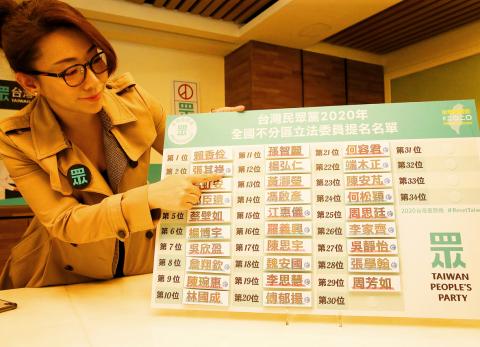The Taiwan People’s Party (TPP) yesterday announced its legislator-at-large nominees for the Jan. 11 elections, with Taipei Department of Labor Commissioner Lai Hsiang-lin (賴香伶) topping the 29-person list.
Taipei Mayor Ko Wen-je (柯文哲), the TPP chairman, said that the average age of the nominees is 41.4 years, which is 25 years younger than that of another party, and that he is proud that many nominees were selected via an open audition.
It was not clear which political party Ko was referring to.

Photo: CNA
“We are recruiting talented people from the public. We do not care if the applying individual is rich or not, and we do not need them to donate NT$80 million [US$2.62 million] to guarantee them a ‘safe’ seat on the list,” he said, adding that the party recruited people based only on their talent and would pay the NT$200,000 registration fee for them.
The public’s wisdom can surpass an individual’s wisdom, so it conducted an open audition to choose at-large nominees for the first time in the nation’s political history, the TPP said.
“We hold the ideal of ‘open government, public participation, openness and transparency,’ and we are unfolding a ‘silent revolution’ stressing the importance of ‘national governance,’” it said.
Other female nominees include Hon Hai Technology Group Industrial Big Data Office vice president Ann Kao (高虹安) at No. 3, Ko’s close aide and Taipei City Government adviser Tsai Pi-ju (蔡壁如) at No. 5, Shin Kong Life Insurance Co deputy general manger Cynthia Wu (吳欣盈) at No. 7, and Taipei City Government deputy spokeswoman Huang Ching-ying, who gained popularity among young people online, at No. 13.
TPP Secretary-General Chang Jer-yang (張哲揚) said 17 nominees were selected through an open audition, and 15 people on the list are under 40.
National Sun Yat-sen University College of Social Science dean Jang Chyi-lu (張其祿), who was selected through an open audition, is No. 2.
When asked why the party nominated only 29 people, despite Ko repeatedly saying that it would nominate a full list of 34 candidates, Chang said there were other nominees, but his aides suggested dropping five of them to save NT$1 million in registration fees.
He was also asked about a rumor that some TPP members were unsatisfied with placing Kao, who is considered Hon Hai Precision Industry founder Terry Gou’s (郭台銘) aide, in a safe seat, as Gou’s aides were rumored to be also in safe seats on the People First Party’s (PFP) nominee list.
Ko said the PFP has not announced its list yet, and Gou had asked whether he wanted to switch the places of Kao with Tsai on the TPP’s list, but he thinks Kao has professional skills in big data and technology, and that having more professionals than politicians would be more beneficial for Taiwan.
Asked about PFP Chairman James Soong’s (宋楚瑜) remark yesterday that he had wanted to cooperate with Ko in the presidential election before Ko founded his own party, Ko confirmed that Soong had talked to him about the idea, but he only “listened and laughed,” because Soong did not give him a detailed proposal.

Alain Robert, known as the "French Spider-Man," praised Alex Honnold as exceptionally well-prepared after the US climber completed a free solo ascent of Taipei 101 yesterday. Robert said Honnold's ascent of the 508m-tall skyscraper in just more than one-and-a-half hours without using safety ropes or equipment was a remarkable achievement. "This is my life," he said in an interview conducted in French, adding that he liked the feeling of being "on the edge of danger." The 63-year-old Frenchman climbed Taipei 101 using ropes in December 2004, taking about four hours to reach the top. On a one-to-10 scale of difficulty, Robert said Taipei 101

Taiwanese and US defense groups are collaborating to introduce deployable, semi-autonomous manufacturing systems for drones and components in a boost to the nation’s supply chain resilience. Taiwan’s G-Tech Optroelectronics Corp subsidiary GTOC and the US’ Aerkomm Inc on Friday announced an agreement with fellow US-based Firestorm Lab to adopt the latter’s xCell, a technology featuring 3D printers fitted in 6.1m container units. The systems enable aerial platforms and parts to be produced in high volumes from dispersed nodes capable of rapid redeployment, to minimize the risk of enemy strikes and to meet field requirements, they said. Firestorm chief technology officer Ian Muceus said

MORE FALL: An investigation into one of Xi’s key cronies, part of a broader ‘anti-corruption’ drive, indicates that he might have a deep distrust in the military, an expert said China’s latest military purge underscores systemic risks in its shift from collective leadership to sole rule under Chinese President Xi Jinping (習近平), and could disrupt its chain of command and military capabilities, a national security official said yesterday. If decisionmaking within the Chinese Communist Party has become “irrational” under one-man rule, the Taiwan Strait and the regional situation must be approached with extreme caution, given unforeseen risks, they added. The anonymous official made the remarks as China’s Central Military Commission Vice Chairman Zhang Youxia (張又俠) and Joint Staff Department Chief of Staff Liu Zhenli (劉振立) were reportedly being investigated for suspected “serious

American climber Alex Honnold is to attempt a free climb of Taipei 101 today at 9am, with traffic closures around the skyscraper. To accommodate the climb attempt and filming, the Taipei Department of Transportation said traffic controls would be enforced around the Taipei 101 area. If weather conditions delay the climb, the restrictions would be pushed back to tomorrow. Traffic controls would be in place today from 7am to 11am around the Taipei 101 area, the department said. Songzhi Road would be fully closed in both directions between Songlian Road and Xinyi Road Sec 5, it said, adding that bidirectional traffic controls would